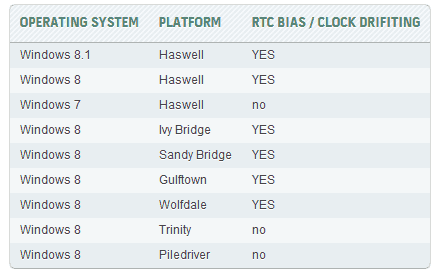HWBot, one of the internet’s largest benchmarking and overclocking communities has banned Windows 8. Any benchmarks from systems running Microsoft’s latest operating system have been removed from community charts and league tables. The action has been taken “due to the severe validity problems with the Windows 8 real time clock (RTC),” explained a blog post on the community site.
Benchmarking tools use the Windows RTC as a reliable constant against which to measure a PC’s performance. The RTC in your PC should be as accurate as the quartz watch on your wrist for most benchmarking purposes. In most PCs the RTC is part of the southbridge and backed up with a small memory cell so it doesn’t forget the time while turned off. Unfortunately Microsoft made some changes to the Windows 8 RTC functionality as it saw that Windows 8 would be used in some low-cost and embedded systems without such clock hardware. The same is true in Windows 8.1 it has been revealed.
The RTC error is manifested if you change your CPU base clock in software after booting, then “it has a massive impact on Windows 8′s ability to keep accurate time,” reports ExtremeTech. Both overclocks and underclocks initiated from Windows have a massive impact on benchmark results. In HWBot’s testing it was found that underclocking a Haswell processor by six per cent after boot resulted in the Windows 8 RTC running a full 18 seconds slower than the actual time, within 5 minutes. The opposite effect was also observed; “When overclocking the base clock frequency, we can see the opposite effect. We overclock by roughly 4%, and after two minutes, Windows Time is 3 seconds ahead of real time” says the HWBot blog. As benchmarks measure a certain amount of operations over a fixed time period this is obviously a big problem in comparing benchmark results between systems.
Initially HWBot concluded that all Windows 8 systems were affected by this timing problem and decided to remove and not accept any benchmark results or records achieved under Windows 8. The community site explains that for all systems to be compared the RTC should be equal in all systems and Windows 8 raises too many question marks.

Systems which do and don't exhibit the RTC clock drifting problem
UPDATE: AMD systems running Windows 8 don’t have these RTC problems
In an update to the original blog post on the HWBot site today some more findings about the Windows RTC issue have been revealed. It appears that Windows 8.1 works in the same way, with regard to timekeeping, as Windows 8 so in that respect it’s no improvement. Looking at different processors and motherboard setups HWBot has also recently deduced that pre-LGA775 systems aren’t affected by this problem. Also AMD systems seem to be completely free of this clock-drifting issue under the tested circumstances.
HWBot will continue to provide updates on its investigations and says that more news will be published today. Perhaps the site will decide that AMD systems with Windows 8 will now be acceptable for inclusion in its charts and league tables.













